Working in Football
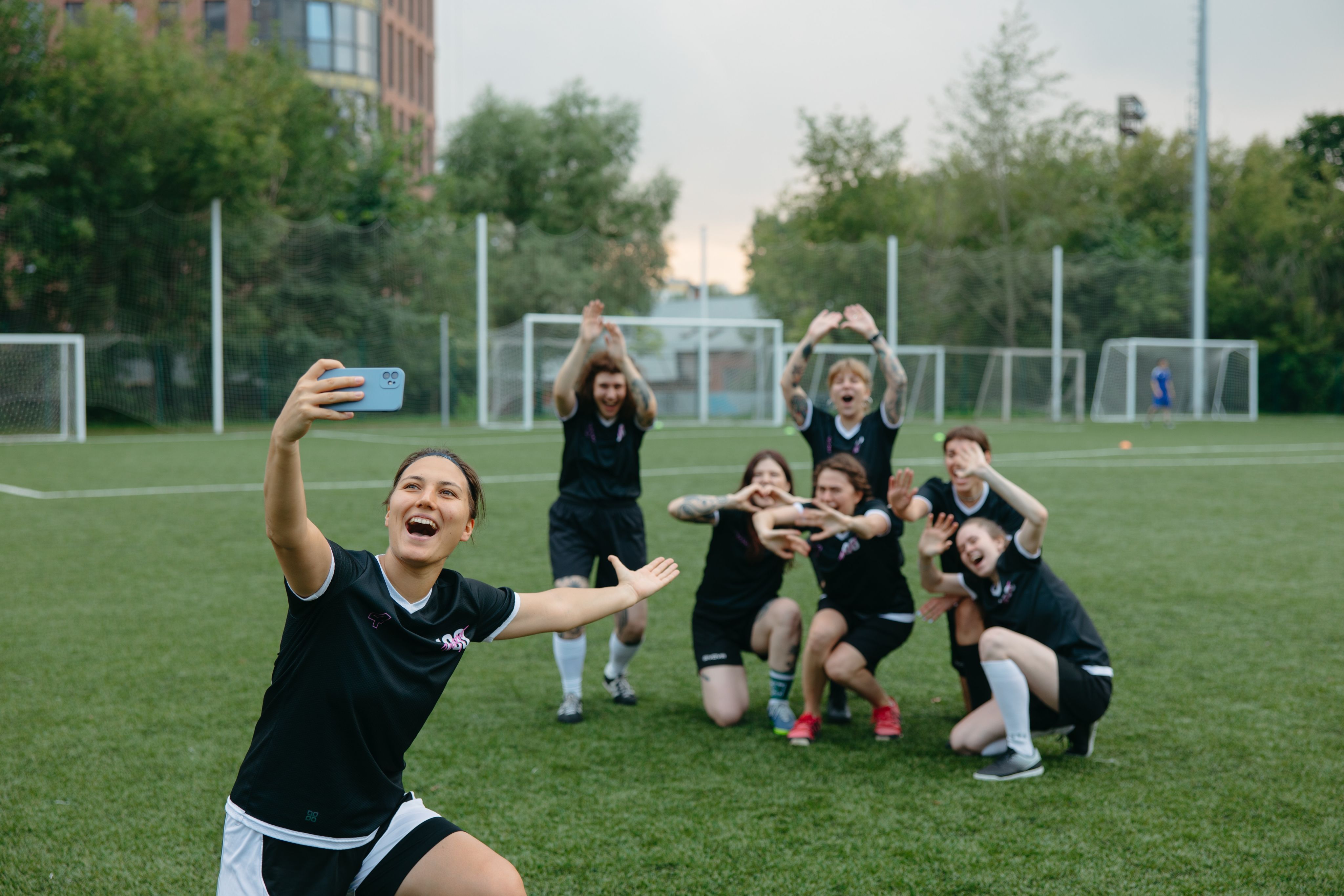
Football is one of the most competitive occupational fields. Many enthusiasts dream of working in this profession and combining their passion and love for the sport with their career. This highly competitive environment is still heavily dominated by males, which makes it even more difficult for females to gain a foothold in the profession. The women who do get a foot in the door have often been the victims of misogynistic abuse.
‘People deserve to feel like they belong’
Sarah Breslin has been an Aston Villa supporter all her life. She followed in her families footsteps and has always had a close relationship with football. Sarah is a committee member for Villa and Proud, the LGBTQ+ and supporters network for Villa, and her role in this is Women Football Officer. She has just set up a supporters network for all women and nonbinary people who are fans of Villa, the Villa Bellas.
“We want to tackle misogyny and sexism from two points of view,” Sarah says. “From the player's point of view, they receive hate on social media, and they might get abused on the pitch. We also look at misogyny and sexism from a fan's perspective. We support female fans who go into men’s games and are affected by sexism, but we also just try to offer a network of people to connect and build friendships and relationships with. Sometimes, the prospect of going to a football match, practically alone, can be really quite daunting and scary. I know I’ve had that in the past.”
For Sarah, the overall situation for females in football is improving: “You can see that with the investment and the interest it's so much better. It’s amazing because a couple of seasons ago in the championship, all the players were part-time, they had training in the evenings because they still had full time jobs. So it is the investment into football that does make it better for women in football. That's not just on the pitch, that's the fans as well, because if they could see the women being invested in, more men will go to see the game.”
Seeing female journalists on television is very important to promote equality in football: “Visibility matters so much for young kids or teenagers, or for students who want to get into that industry. But also men seeing it. They need to see it for it to become normal, and there needs to be repetition. It needs to become the norm for men to accept that it's the norm. I think Alex Scott is an absolute prime example, she's on the telly talking about football every week. And while some men still don't accept it, there are so many that do and show their appreciation."
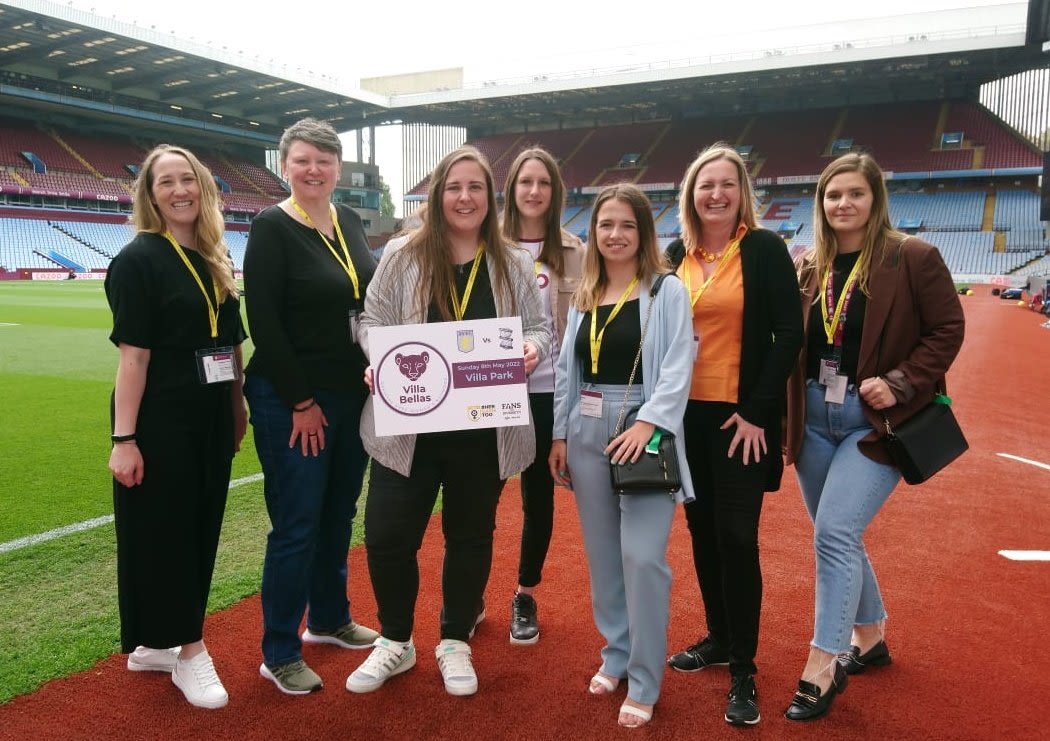
Members of Women in Football, Her Game Too, and Villa Bellas at Villa Park. Credit: Sarah Breslin.
Members of Women in Football, Her Game Too, and Villa Bellas at Villa Park. Credit: Sarah Breslin.
Besides being beIN SPORTS’ Premier League pitch side and Champions League correspondent, senior sports correspondent Carrie Brown is also the first female chair of the Football Writers Association (FWA). Carrie wrote her first sports article when she was 11, even though she was told she couldn't play football at school because it wasn't lady-like. “So don't tell me I can't do something, or I'll be obsessed with it.”
Despite female quota’s being in place, Carrie believes press boxes are still underrepresented by women. “Our broadcasters are definitely going in the right direction, but we're not seeing enough football writers come through to go into press boxes.”
However, female quotas are difficult, Carrie argues: “obviously it’s really addressing an imbalance that's happened over generations, so this is what leads to the paranoia, and that's why I think it's the responsibility of organisations like the Football Writers Association to make sure we're helping universities get well-educated, brilliant women. The reality is you can have a diverse hire, but if they're not good enough, they won't keep their job.”
“There are a lot of opportunities out there, and I wish there was a single one of them when I was young,” Carrie says. “There wasn't even a university course in journalism. So, in terms of football journalism, there are so many opportunities to get into the industry. Now you just follow on social media and follow Women in Football or join the FWA in the mentor scheme.”
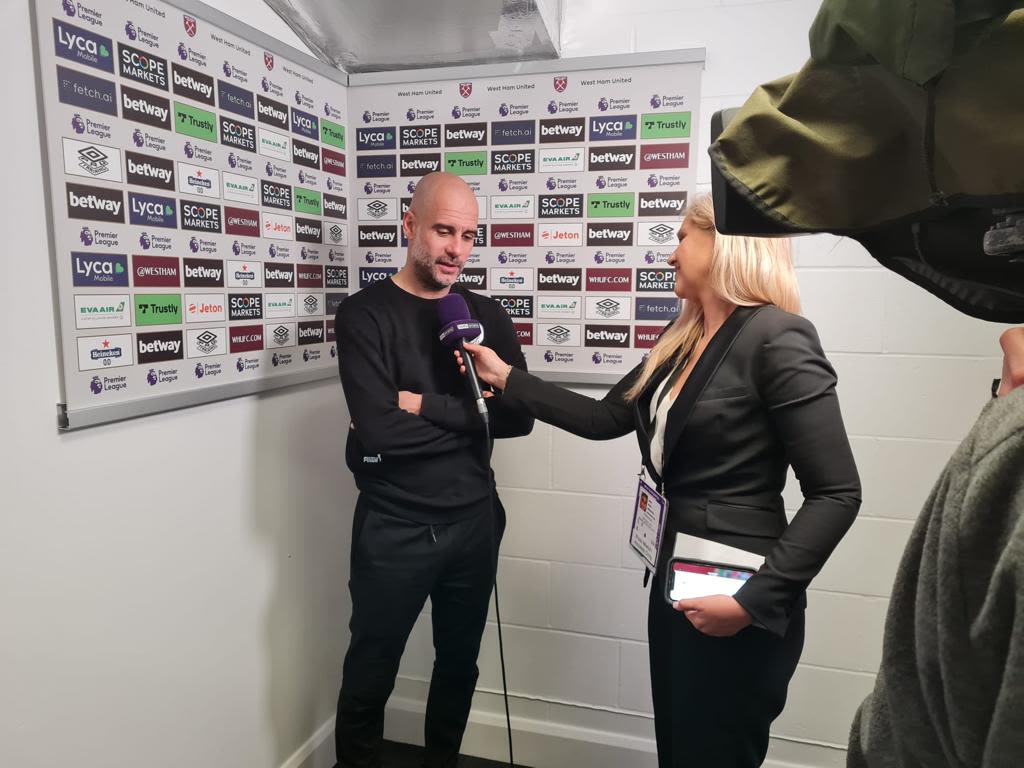
Sarah Jayne Nickless currently works at the Association of Colleges (AOC) as the National Women’s Football Development Officer. “In our football development team we've got an apprenticeship program that supports young people to develop female football in their colleges much wider. Previous to that I was at the FA and leading in youth leadership where my sole focus was how to support young people through football when they're not playing.”
Playing football was an escape from reality for Sarah Jayne when her parents broke up, and now she gets to offer the same support to others: "it's quite a nice circle to loop around to now by doing that for other people and creating escapes for young people to use sport to get away from whatever they're dealing with in life.”
When asked if there will ever be equality between males and females in football, Sarah Jayne took a long pause. “That’s like asking if there's going to be global peace," she says, laughing a little bit. When she is ready to reply, she says: "We've got a generation of young people right now that are so passionate, so driven, they want to make a change. They want to know that their life's been worth living, and I think we're at a generation now where people will know right from wrong, and they're prepared to say it, and they’re not going to stand for stuff that we don't think should be happening, and I think that's great.”
Currently, the biggest issue football faces is where older generations have the need to share their very strong opinion of what's right and wrong in terms of sexuality, what relationships look like, what males and females should be doing, who should be earning more, and what the role of the female in the office is. Sarah Jayne says "there's a lot of people growing up in a world where people can be whoever they want and be celebrated for it, but there is a generation of people that don't see that and don't accept that as a true reality of who we are.”
“I love our team,” Sarah Jayne replies happily, “the gender balance is great. Nobody is ever made to feel like they are lesser than their male counterpart. And I think that's because we've got females at every level of leadership and by design or fault, I don't know. I haven't been here long enough to question that. And I think when done well, it makes everyone feel a lot more at ease, feeling like they can be themselves and not have to prove themselves.”

‘How many times did we hear that it was just a joke, it was just banter?’
Despite all these improvements and silver linings, misogyny rears its ugly head in the careers connected to football.
Far before her volunteer work at Aston Villa, Sarah’s first experience with misogyny was actually in her own family home: “I had a family member when I was a teenager that, because I was so into football, said to me that I would make a man very happy. That was wrong on two accounts, because it implied I would be heterosexual for a start, but also that that was all I had to offer a man.”
Sarah believes when it comes to misogyny she has experienced, it’s more minor things than one big situation: “They still stick in your mind, and it can be those things that do put people off football. Sometimes banter is just taken too far, and it ends up as sexist or misogynistic. It’s knowing where the line is. You need to call people out as well. Why would you have to justify why you support a football team? Men don’t get asked those questions.”
Accessibility has made all the difference in football, Sarah says: “It's more acceptable for a girl to grow up and talk about football in primary school and play football in the playground with the boys or even just with each other. Whereas when I was at school, it was sort of the opposite. Talking about football felt sort of foreign, I wasn't able to talk to other girls about it. I literally felt like I was on my own.”
When Sarah falls victim to misogynistic abuse, she tends not to speak up: “I thought that was normal. I thought that people were allowed to say those things and get away with it. As football started to change, I think attitudes and minds had started to change, and I know that's not right, and I am more comfortable challenging abuse.”
In terms of improvements, Sarah has several opinions: “I think the biggest change needs to be social media. It has to be regulated more because if you say those things in the stand, you can report it, and you can be charged for it. If you say it on Twitter, there's no accountability. You report it. You can see it is absolute blatant sexism, misogyny, homophobia. Twitter replies something like ‘Well, we know this might not be what you want to hear, but we don't see that there's anything wrong with it’.
Language needs to change. Behaviours need to change. Attitudes need to change. Sarah believes that if "we can get that education out there and people can learn, it'll be a much better sport. People deserve to feel like they belong.”
A 2014 survey by Women in Football "has revealed that 66.4% of women working in the sport have witnessed sexism in the workplace, with individuals being told they will ‘never work in the game again’ if they reported it." This shows that misogyny is deeply rooted for females working in football.
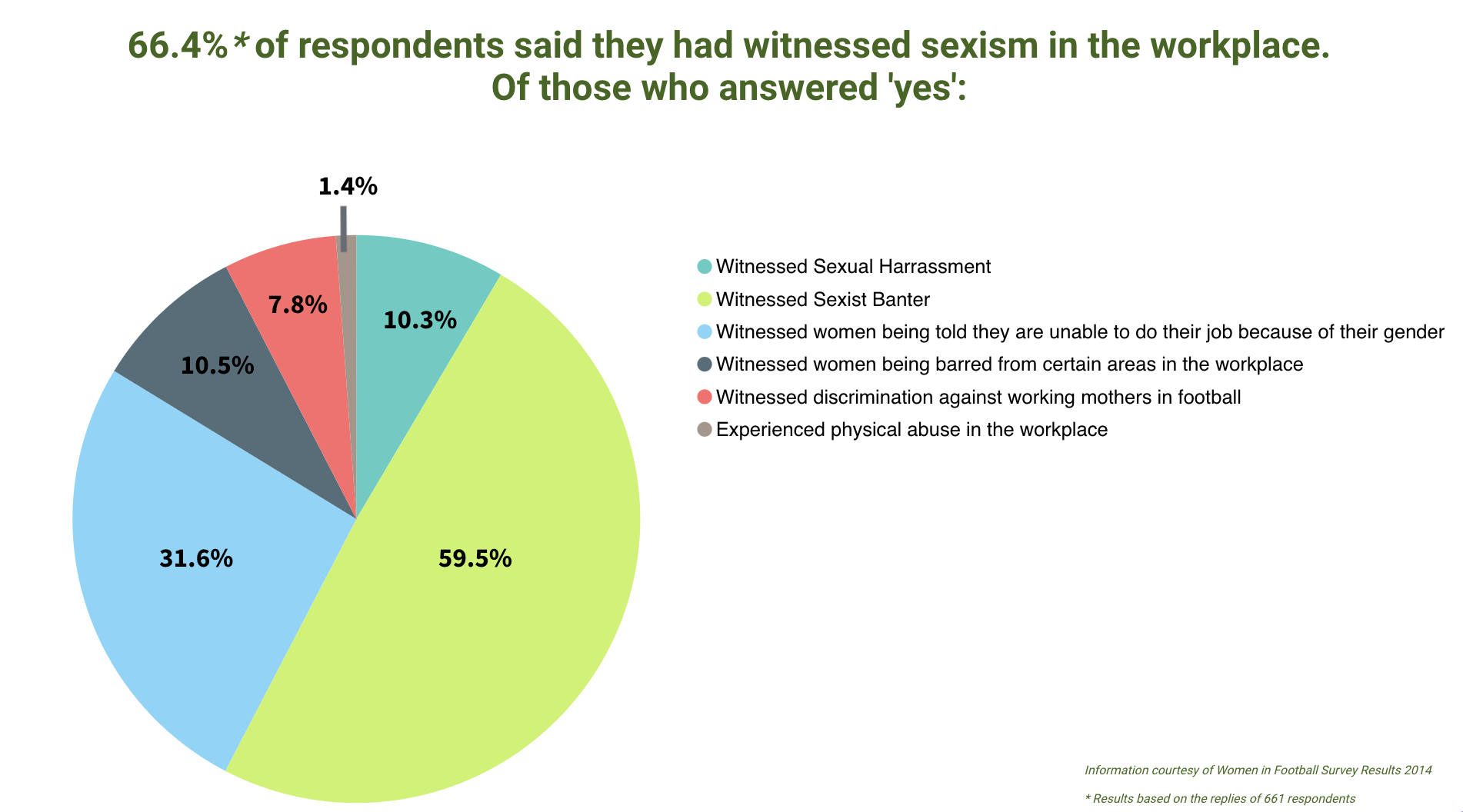
Credit: Luca Wodtke
Credit: Luca Wodtke
As with Sarah, Carrie's first experience of misogyny occurred very early in her life. In school, Carrie was told by her female PE teacher that playing football is not lady-like: “But I was allowed to put a mouth shield in my mouth and go and play hockey, and apparently that was more lady-like. There wasn't really any way around it, and there wasn't any other girl that wanted to play football.”
It was all men bar a few women when Carrie started working: “I have experienced misogyny, but it was the men that championed me and helped me. I'm a little protective of football being misogynistic or changing because so many men have championed me when I didn't believe in myself. When I was asked to join the committee at the Football Writers Association, it was men who advocated for me to join.”
To support females in her company, Carrie has set up a WhatsApp group for all women who are out reporting to contact each other if anyone is experiencing problems with safety.
Carrie believes there is a bit of paranoia in the industry that females will take over: “I had one person who's doing brilliantly now. I was quite surprised when he talked to me in the football ground and said, ‘I've got no chance now, Carrie, because I'm a white man’ and that took a bit of time to sink in, and I said ‘look up at the press box. Every single one of those jobs is your job, and every one of these jobs is available, and actually if you look at row by row, it’s white, and it’s male. And all those jobs are still up for grabs, even if 10% of them are going to go to others’.”
In terms of opportunities for females in football, Carrie says: “It's our responsibility to make sure there is a pathway. It's a responsibility I take very seriously and Kick It Out, Women in Football and the FWA, are all doing everything to address what we feel needs to be done. I think the more we do positively for one area, the more we realise there needs to be more done for another, so it is quite challenging because the more you do it feels the more mistakes you make. I do think as we're making change in the industry, if change isn't coming quite quick enough, or if mistakes are made while trying to make change, we put our hands up and say ‘we made a mistake, that's OK’ if what you're trying to do is positive.”
One thing Carrie really wants to see change is that every school should have football for males and females, something that isn't common practice in the UK yet. However, The FA has launched a new campaign - Let Girls Play - to give all girls equal access to play football in school by 2024.
When this campaign comes into action, Carrie states that “the coaching given to boys and girls should be the same, and the input and the money. The minute those are in place then generationally the misogyny stops because generationally women are being given the equal level of coaching or access to football as boys. We're getting there. But we know that the funding of coaching is still well behind for the women.”
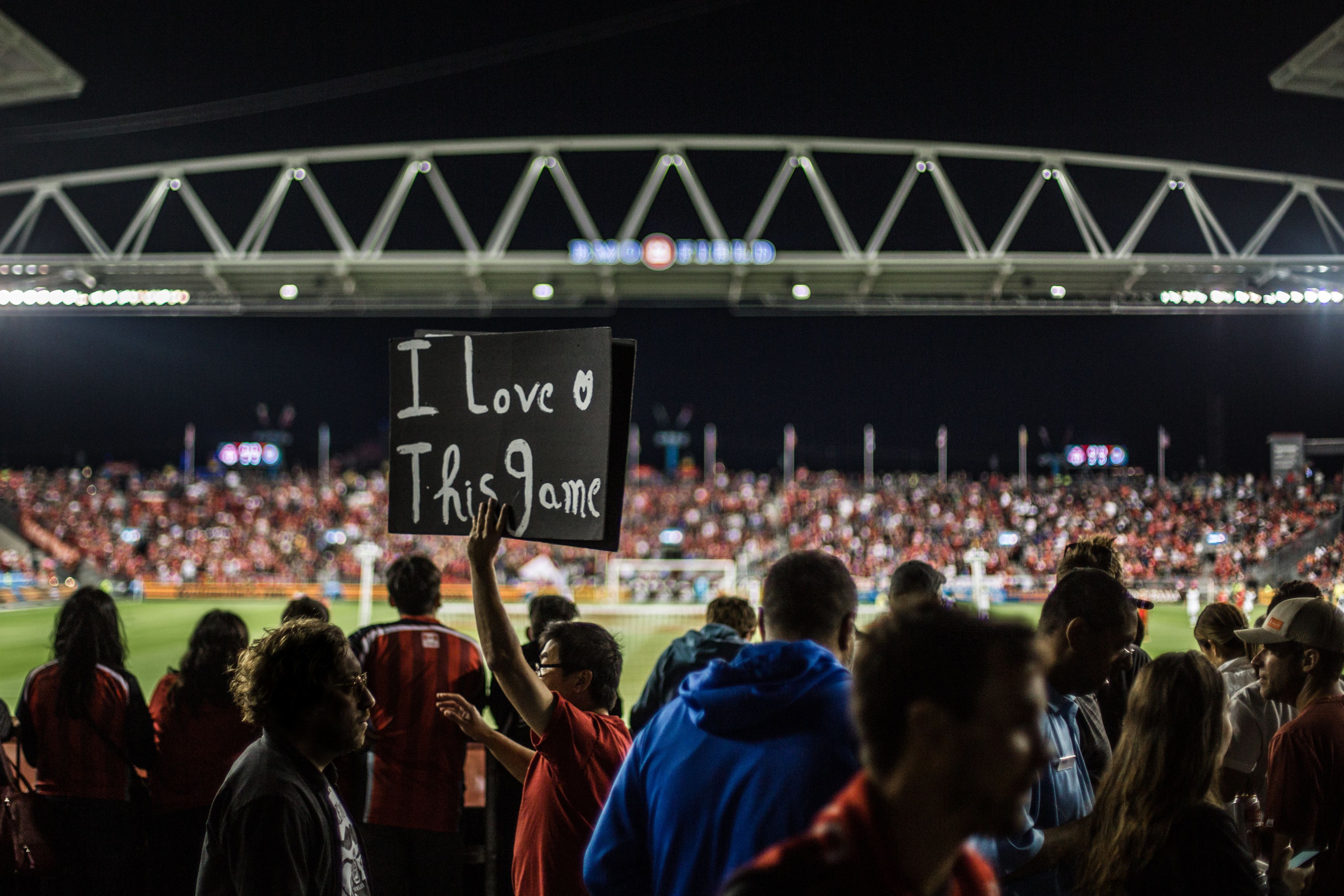
“The government is doing a lot but while social media companies are engaging and say they're doing more, they're not doing anywhere near enough,” Carrie says about the rise of online abuse. “They are social media companies. Companies are there to make profit, engagement, negative or positive. Viewers, followers, etc… drive revenue so that really struck home to me. We need to make sure that they are accountable, and that the government needs to do more.”
An issue Sarah Jayne sees in football is that the majority of those that run football are white males. In fact, only 6% of the EFL’s workforce is from BAME backgrounds. A large part of what Sarah Jayne does is to try and address these inequalities "and ensure that the game is for the people that are playing it and those that are enjoying it. It needs to be fit for them, and be what they want it to be. If they’re committing time, we can’t just commit to three o’clock on a Saturday. The world is moving, and we’ve got to move with it."
Less than 1% of aspiring football talents will ever get close to professional football. "We've just got to remember that there's a person within that system," Sarah Jayne argues passionately. "I think football has got a massive responsibility in how we influence people. So when people do leave the game and if they don't make it into that 1%, which is the majority, they've got something from the game. It wasn't a wasted venture for them. I don’t want them to think, ‘I didn't make it. I've lost on that stage’. I want them to think, ‘I've not made it, but this is what I've learned. This is how I've become who I am, and I'll take that into whatever I do next’.”
“In a professional capacity, there have definitely been moments where being female has been an issue for people,” Sarah Jayne says. “My presence in a room is an issue for people because I'm ticking boxes in some people's views and having to really work hard to gain the trust and respect of colleagues, but if I were a male walking into that room, I would have that respect just because I was male, I could have no knowledge of the topic, but I've already got a free ticket into the club.
Before working for the AOC, Sarah Jayne was on the FA Youth Council and represented young people on the FA Council. “They’re a group of really wonderful people, but do they represent the game of football? I don't think so, but there's certainly a lot of work being done to try and manage that and ensure the game moves closer towards representing everyone that plays it and loves it is involved, but that was, I think, a real shock for me to be in that environment where there were several jokes as I first walked into a room, and I had to question if I was in the right room."
One situation Sarah Jayne recalls is when she was on the way to a meeting with a colleague. They had to pass through a shopping outlet, and her colleague made a comment saying 'I'm sorry I can't take you shopping today'. Sarah Jayne was instantly taken aback: “Is this what I am perceived as? It belittles all the work that’s been done to get into this position. I’m not here for this. The response was, ‘oh, I didn't mean it. It was just a joke.’ And how many times did we hear that it was just a joke, it was just banter? I sometimes think when people relax, and they say things like that, they're probably things they’ve been thinking about for much longer and not a slip-of-the-tongue. It’s seeing behind the mask.”
The misogyny Sarah Jayne shared is mirrored in the aforementioned 2014 Women in Footbal survey. Of the 661 respondents, 57% said they had experienced sexism in the workplace, with more than half of the replies stating they expereinced sexual 'banter' and jokes.
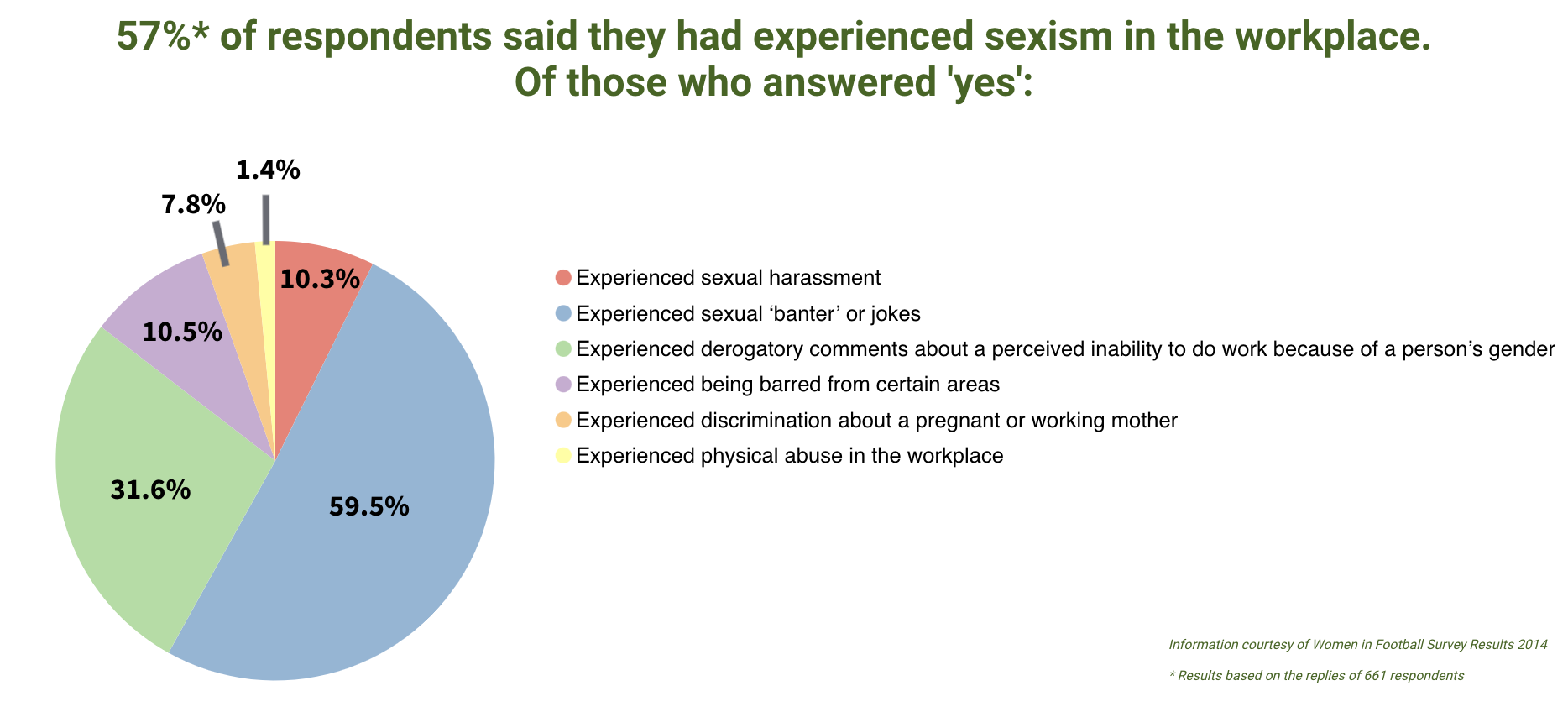
Credit: Luca Wodtke
Credit: Luca Wodtke
Sarah Jayne makes the important point that misogyny isn’t necessarily males towards females: “We think about misogyny, we think around males and slurs towards females and that makes football uncomfortable, but we perhaps don't also think about the role that females play around other females. So you know when I played years ago, got back from an injury, I found out a few weeks after that there was an inside bet on my sexuality that I didn't know about it. So this one girl was like ‘I want to win this bet, what are you?’ and I said ‘I’m no longer part of your team’.”
In terms of facing misogyny, Sarah Jayne emphasises that every little comment can impact your life. “Growing up, I was just the football girl, and I saw that as my identity. I had to hold on to that because if I didn't, I was getting bullied and just being myself wasn't enough. You never just ignore it, it sits in the back of your mind for months, years. It starts to help or hinder you in different environments.”
A big issue that has been mentioned time and time again is that it is diffuclt to know who to turn to for support in football : “We've just got to make things as easy as possible for people. If these things happen, what's the quickest way we can report it, have it taken seriously and act on it? Rather than a series of loopholes of having to write a report to go to a committee to go to the next thing for the next thing? And then you never hear back if anything ever happened. That's almost the worst part is, you know, I've been prepared to share something with you, and it's causing me a problem and I never find out what you've done with that information? There's a whole thing there of closing the loop. And seeing change. Seeing a response that I don't think we see enough of, I think we tell people to report things, and then we experience it again, or we see another scenario where it's almost a carbon copy.”
In her current role, Sarah Jayne is supporting colleges to work with their local NHS. “We're seeing more and more people being referred to sport as a way of coping, as a way of dealing with diagnosis of whatever they're going through. And I think we're trying to just always be ready for that. So if people are being referred to us, it doesn't matter what their ability is or what they're trying to do, they just need a space to themselves. I think we sometimes forget how many people find themselves in and through sport and attach themselves so heavily their identity is so wound up in it.”
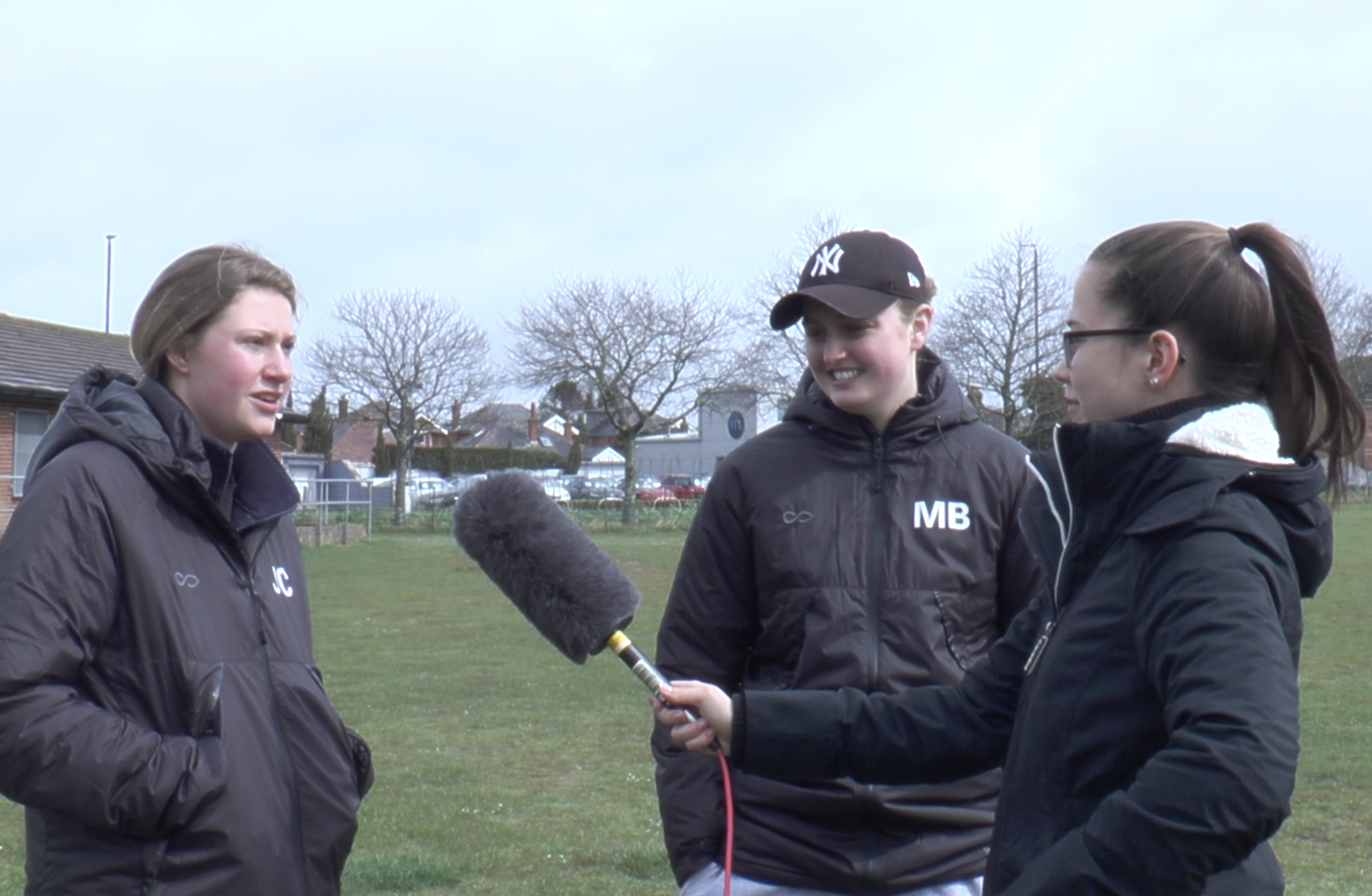
‘The purest form of exhilaration’
For Sarah Jayne, football is her place to belong when she doesn’t belong anywhere else. “It's always been an escape. I'll always be grateful. It's taught me so much to help me find who I am and no matter whatever I go on to do next, the chapters that I've lived through will always be a part of my story, even though I'm not ‘Sarah the football girl’ any more. But there will always be parts of me that have learned to be who I am from the game, and I think that's really important that I never lose sight of that.”
“It comes in waves for me,” Sarah explains, her hands making a wave motion as she speaks. “Sharing it is a massive thing. So when I don’t have people to share my interest with, it kind of dips a little. Just sharing that moment with other fans. It's definitely a sport where you need to share it with people. More recently, I suppose, watching the women play has just been an absolute joy. I feel a sense of community from watching the Women's playing because the crowds are smaller, and it is a more enjoyable experience going into the football match. It doesn't matter what's happening, you're all focused. You all want the same. You're all there because you love the same sport.”
Carrie feels “unbridled passion” for football. “It’s the purest form of exhilaration. You never know what will happen. Probably the ecstasy and the agony, is how I would sum up my love of football. You have to wait for those moments and then the sweetest moments when the match is won. The camaraderie that comes with it, the skill, the ability, those wow moments. And I love youth, the talent spotting, the talent as it comes through. There are so many examples of just neighbours that took a daughter to training when the parents couldn't take them, they had nothing to gain from it, but that's made them England superstars and those stories, the grassroots stories.”
